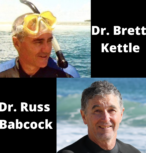DNA reveals the past and future of coral reefs
New DNA techniques are being used to understand how coral reacted to the end of the last ice age in order to better predict how they will cope with current changes to the climate. James Cook Univer

From 2005 to 2022, the main node of the ARC Centre of Excellence for Coral Reef Studies was headquartered at James Cook University in Townsville, Queensland (Australia)








Abstract: Vertigo3 is a new class of small, fast and agile ‘true-flight’ underwater glider, purposely designed for robotic, artificial intelligence-assisted broadscale marine surveys, and capable of operating at speed within topographically complex reefal environments. In this webinar we touch on the Vertigo3 skillset and focus on preliminary results of its application to managing outbreaks of the coral eating crown-of-thorns starfish (COTS) on the Great Barrier Reef. Vertigo3 tows were performed in July 2020 in the Capricorn Bunker Group of the southern GBR, with imagery used to develop ML tools for COTS detection, geolocation, tracking, counting and size estimation; feeding scar identification; and reef habitat classification. Whilst the training sets are still limited to four reefs and approximately 200 starfish, Vertigo3 is already demonstrating COTS detections superior to the combined efforts of domain experts reviewing archived footage. Comparison of glider and manta tows reveals interesting patterns of abundance with implications for future survey methodology. Preliminary data suggest that the glider is a useful tool that may find application in a wide range of coastal marine use cases.
Biography: Dr Brett Kettle is a marine scientist, inventor of the Vertigo3 glider, and Founder of Vertigo3.org. His early research included crown of thorns starfish ecology, then a private sector career that included several innovations in coastal marine sciences. In 2017 Brett began developing more effective tools to replace the 50-year old manta tow method applied to starfish management on the GBR. A year and several prototypes later this became a collaboration with CSIRO on Vertigo3, its flight control systems and embedded machine learning.
Biography: Dr Russ Babcock is a marine ecologist with CSIRO Marine and Atmospheric Research. Russ has over 35 years of research experience on coral reefs on the GBR, Western Australia and the Pacific, working closely with agencies and industry and leading multidisciplinary teams to address management needs. He has broad interests including invertebrate reproduction and larval ecology, the effects of coastal development, marine conservation and trophic cascade effects.
New DNA techniques are being used to understand how coral reacted to the end of the last ice age in order to better predict how they will cope with current changes to the climate. James Cook Univer
A new study on the effects of climate change in five tropical countries has found fisheries are in more trouble than agriculture, and poor people are in the most danger. Distinguished Profess
James Cook University researchers have found brightly coloured fish are becoming increasingly rare as coral declines, with the phenomenon likely to get worse in the future. Christopher Hemingson, a
Researchers working with stakeholders in the Great Barrier Reef region have come up with ideas on how groups responsible for looking after the reef can operate more effectively when the next bleaching
Abstract: As marine species adapt to climate change, their heat tolerance will likely be under strong selection. Individual variation in heat tolerance and its heritability underpin the potential fo
Abstract: The Reef Ecology Lab in KAUST’s Red Sea Research Center explores many aspects of movement ecology of marine organisms, ranging from adult migrations to intergenerational larval dispersal
Abstract: Macroalgal meadows are a prominent, yet often maligned component of the tropical seascape. Our work at Ningaloo reef in WA demonstrate that canopy forming macroalgae provide habitat for ad
Abstract: Sharks are generally perceived as strong and fearsome animals. With fossils dating back at least 420 million years, sharks are not only majestic top predators but they also outlived dinosa
Abstract: Connectivity plays a vital role in many ecosystems through its effects on fundamental ecological and evolutionary processes. Its consequences for populations and metapopulations have been
Abstract: Evolution of many eukaryotic organisms is affected by interactions with microbes. Microbial symbioses can ultimately reflect host’s diet, habitat range, and even body shape. However, how
Abstract: The past few years have seen unprecedented coral bleaching and mortality on the Great Barrier Reef (GBR) but the consequences of this on biodiversity are not yet known. This talk will expl